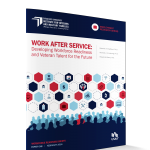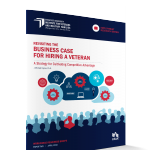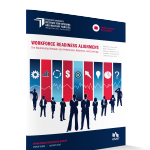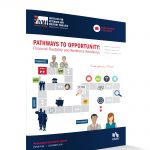Workforce Readiness Research Series
Introduction
As part of our broader employment research series, and with the generous financial support and collaboration of USAA, we are exploring the topic of workforce readiness as it relates to transitioning service members and veterans in the civilian labor force. The Workforce Readiness Research Series will cover a range of important topics, including:
- The complex relationship between transitioning service members and veterans and workforce readiness
- Interactions between career preferences, job matching, performance, and retention
- Links between financial readiness, spouse employment, and workforce readiness
- Employer perspectives on workforce readiness and key factors and practices that influence retention and job satisfaction among veteran employees
Paper 1: Work After Service: Developing Workforce Readiness and Veteran Talent for the Future
 The first paper in this series builds a framework for an enhanced understanding of the concept of workforce readiness as it applies to transitioning service members and veterans.
The first paper in this series builds a framework for an enhanced understanding of the concept of workforce readiness as it applies to transitioning service members and veterans.
Download Full Report Download Executive Summary Read Press Release
Paper 2: Revisiting the Business Case for Hiring A Veteran: A Strategy for Cultivating Competitive Advantage
 The second paper in the series responds to recent focus and debate on measuring companies’ return on investment for their veteran hiring programs and emphasizes how employers can turn veteran talent into a competitive advantage in talent acquisition, talent deployment and talent development.
The second paper in the series responds to recent focus and debate on measuring companies’ return on investment for their veteran hiring programs and emphasizes how employers can turn veteran talent into a competitive advantage in talent acquisition, talent deployment and talent development.
Download Full Report Download Executive Summary Download Infographic Download Accessible Infographic Read Press Release
Paper 3: Workforce Readiness Alignment: The Relationship Between Job Preferences, Retention, and Earnings
 The third paper in this series addresses the complex and interrelated relationship between veteran job preferences, skills-matching, performance, and positive career outcomes such as retention and earnings. The research provides a deeper analysis of veterans’ employment experiences post-separation, specifically the long term benefits of aligning military-conferred skills with career goals and expectations.
The third paper in this series addresses the complex and interrelated relationship between veteran job preferences, skills-matching, performance, and positive career outcomes such as retention and earnings. The research provides a deeper analysis of veterans’ employment experiences post-separation, specifically the long term benefits of aligning military-conferred skills with career goals and expectations.
Download Full Report Download Executive Summary Read Press Release
Paper 4: Pathways to Opportunity: Financial Flexibility and Workforce Readiness
 The fourth paper in this series explores key factors that contribute to military family financial readiness—prior to transition—so that service members may exercise control over their finances and optimize their choices at transition to optimize their financial opportunities and minimize the risk of financial hardship. The goal for any service member is to maximize their range of options in transition by capitalizing on their unique assets (education benefits, intangible leadership skills, etc.) and limiting potential liabilities (limited professional network, advanced education or training) through sound financial preparation.
The fourth paper in this series explores key factors that contribute to military family financial readiness—prior to transition—so that service members may exercise control over their finances and optimize their choices at transition to optimize their financial opportunities and minimize the risk of financial hardship. The goal for any service member is to maximize their range of options in transition by capitalizing on their unique assets (education benefits, intangible leadership skills, etc.) and limiting potential liabilities (limited professional network, advanced education or training) through sound financial preparation.
Download Full Report Download Executive Summary Read Press Release
